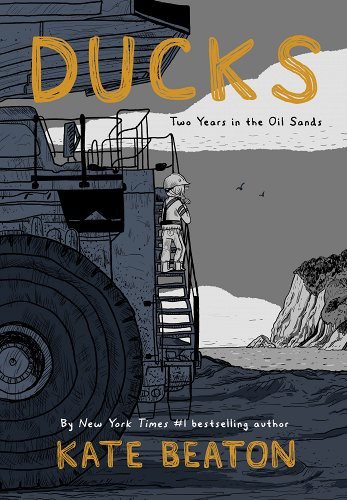graphic novel stupenda
4 stars
interessante la prospettiva sulla moralità che l'autrice ha all'interno del libro TW: violenza di genere

Published Sept. 23, 2022 by Drawn & Quarterly.
Before there was Kate Beaton, New York Times bestselling cartoonist of Hark! A Vagrant, there was Katie Beaton of the Cape Breton Beatons, specifically Mabou, a tight-knit seaside community where the lobster is as abundant as beaches, fiddles, and Gaelic folk songs. With the singular goal of paying off her student loans, Katie heads out west to take advantage of Alberta’s oil rush—part of the long tradition of East Coasters who seek gainful employment elsewhere when they can’t find it in the homeland they love so much. Katie encounters the harsh reality of life in the oil sands, where trauma is an everyday occurrence yet is never discussed.
Beaton’s natural cartooning prowess is on full display as she draws colossal machinery and mammoth vehicles set against a sublime Albertan backdrop of wildlife, northern lights, and boreal forest. Her first full length graphic narrative, Ducks: Two Years in the Oil Sands …
Before there was Kate Beaton, New York Times bestselling cartoonist of Hark! A Vagrant, there was Katie Beaton of the Cape Breton Beatons, specifically Mabou, a tight-knit seaside community where the lobster is as abundant as beaches, fiddles, and Gaelic folk songs. With the singular goal of paying off her student loans, Katie heads out west to take advantage of Alberta’s oil rush—part of the long tradition of East Coasters who seek gainful employment elsewhere when they can’t find it in the homeland they love so much. Katie encounters the harsh reality of life in the oil sands, where trauma is an everyday occurrence yet is never discussed.
Beaton’s natural cartooning prowess is on full display as she draws colossal machinery and mammoth vehicles set against a sublime Albertan backdrop of wildlife, northern lights, and boreal forest. Her first full length graphic narrative, Ducks: Two Years in the Oil Sands is an untold story of Canada: a country that prides itself on its egalitarian ethos and natural beauty while simultaneously exploiting both the riches of its land and the humanity of its people.
interessante la prospettiva sulla moralità che l'autrice ha all'interno del libro TW: violenza di genere
There are some heavy topics covered in this book. But I feel they are important to share out. Specially if you are a man, this point of view of a woman in a male-centric workplace makes you realize all the things that you may have missed. A must read for anyone who loves graphic novels
There are some heavy topics covered in this book. But I feel they are important to share out. Specially if you are a man, this point of view of a woman in a male-centric workplace makes you realize all the things that you may have missed. A must read for anyone who loves graphic novels
How can men be so crass, so misogynistic, so violent, when transplanted to the extreme environs of capitalist extraction far from anyplace recognizable as home? Documentary reflection after anguished disillusion and mistreatment, drolly told.
People need to read this. As a father of a little girl, the book is terrifying, so it makes the need for a perspective shift an urgent one.
“Enjoy” isn’t quite the right word for a read that’s about something as nuanced and anguished as this is, but it’s also apt. I lingered over it and zoomed through it. It’s generous and devastating, sympathetic to the awful positions poor people find themselves in to get by and to the ways it warps who they are, and devastating in how it depicts the violence directed at everyone—women and the land, especially, but also the men who are used up without regard to turn profits for the company.
Beaton’s gritty graphic memoir about her experiences as a woman in a male-dominated industry and the crushing effects capitalism has on vulnerable people is effective and Eisner-worthy.
